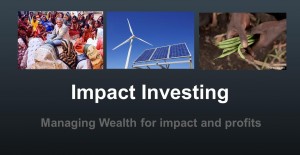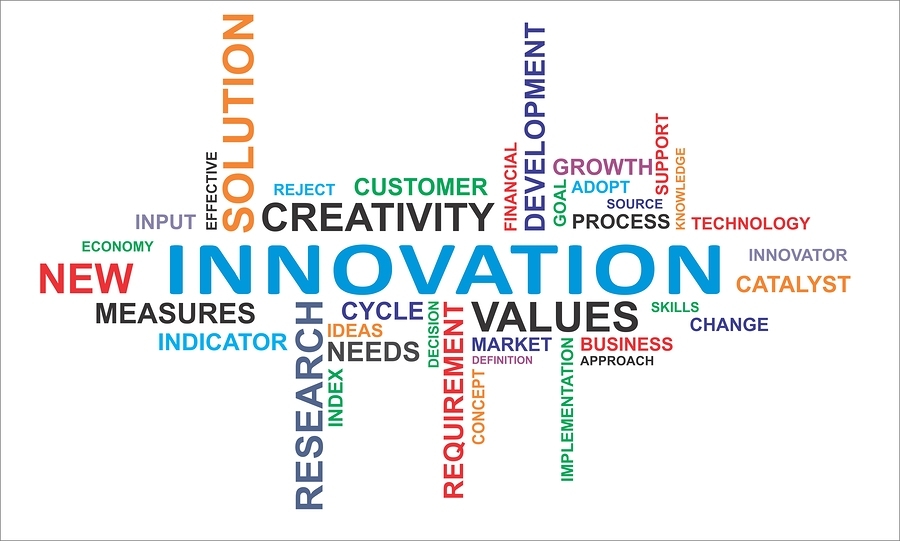
Some recent great reads
1) Willy Foote’s article on agricultural finance, How To Help 450 Million Poor Farmers–Without Destroying The Earth
2) WEF’s report on mainstreaming impact investments: From the Margins to the Mainstream
3) Morgan Stanley’s commitment to Investing with Impact platform, 5 year target 10bn USD of client assets
November was a month of conferences with TBLI, EVPA and Lugano Fund Forum. The first two are very much focused on impact but LFF is a more conventional Fund Forum for accredited investors and wealth managers in Ticino and Italy. It was therefore great to see that they incorporated a panel for Impact Investments where I had the opportunity to give a presentation introducing this topic “Managing Wealth for Impact and Profits“
Category Archives: conference/symposium
Changing mindsets… importing innovative models made by emerging and developing economies

Just back from the “Partnering for Global Impact” a two day forum by EBD Group in Lugano. Key areas covered were agriculture, education, healthcare housing, financial services and water.This forum facilitates outcomes in impact investing and philanthropy through one to one meetings alongside great keynote addresses (such as Sir Ronald Cohen) and panel discussions. It was a well organized event with very good content and great for networking.
Having attended numerous events on impact investment and philanthropy and having been fortunate to learn from outstanding social enterprises over the past 10 years I believe that one new topic should be added to these events.
These great forums such as Skoll World Forum, SOCAP, TBLI and PGI are playing a critical role in helping to solve the most serious problems we face through bringing together ideas, people, capital and promoting the more efficient use of resources. Find sustainable solutions which are working in emerging economies and scaling it. Funding and capacity building to be provided by impact investors, philanthropists and development finance institutions. It’s great but maybe we could do even better.
One different angle should be added. What could WE in the developed world learn and import from the emerging market innovative models that have been successful? Who has developed or is developing low cost high quality services in education, financial services and healthcare? There are successful education models developed in Latin America that could be used for low income communities in the USA. Perhaps vocational school systems or microfranchising business models that could be useful in reducing youth unemployment in The European Union? The increasing applications of mobile technology for payment systems in Kenya? There is so much innovation happening in emerging economies and we should be pragmatic and maybe a bit humble and change our mindsets to search and learn from the best available solution.
I talked about this idea to some veterans in this field, Suzanne Biegel from Catalyst at Large and ClearlySo, Jed Emerson of ImpactAssets and Blended Value and to Hans Wahl of INSEAD and they all thought it made sense! This topic is worthwhile to dig in further and much more research is needed I hope it will be included in future forums.
A must see video from the Skoll World Forum 2012
This year’s Skoll World Forum on Social Entrepreneurship was titled FLUX: Seizing momentum and driving change. This forum continues to be one of the best venues to meet up, update, share, collaborate and form new partnerships between all the players, social enterprises, private sector and public sector. One of my favourites talks at this year’s Skoll Forum was Hans Rowling’s presentation on the future of world population.
Skoll Forum 2011
A belated report on the Skoll Forum 2011. This year’s main theme was “Large Scale Change” . Lots of content. I recommend the selection of superb blogs, and in highlights you can find all the sessions and plenaries as video or podcasts. It was nice to have been able to attend Skoll forum for the 5th time in a row as initially I planned to be in Japan teaching social entrepreneurship for the YES Japan Creating Drivers for Sustainability program (which was understandably cancelled due to the triple disaster). My takeaways: of course the optimistic, positive energy that always flows at Skoll Forums, networking, the interactive meetings at Oxford Jam and last but not least connecting with Shino (Japan Research Center), Ichi (Social Media) and Patrik Meier (Crisis Mapping, Ushahidi) to discuss and share information on how to support Japan in the wake of the recent triple disaster.
Impact investments…going mainstream in 2011
Looks like 2011 will be a breakthrough year for impact investments. A recent report by J.P. Morgan/Rockefeller Foundation and Global Impact Investing Network (GIIN) defines impact investment as “investments intended to create positive impact beyond financial return”. In other words, investments intended to; improve or provide access to energy, water, education, health, housing, and financial services for the poor, create jobs or mitigate climate change while also providing a financial return.
The term “impact investments” only surfaced less than 3 years ago and now thanks to the impressive efforts of the Rockefeller Foundation and GIIN it is emerging as an asset class. It is capturing the attention of investors in all segments from philanthropic foundations, high net worth individuals, financial institutions and governments as they all seek to make more efficient use of their capital, achieve better returns (social, environmental and financial) and help solve the world’s social problems. Estimates on potential market size (investment capital) over the next 5 to 10 years range from USD 400bn to USD 1 trillion. Major efforts have been made also in developing standardized metrics with Impact Reporting and Investment Standards (IRIS) and more recently on ratings the Global Impact Investment Reporting Standards (GIIRS) is testing its rating methodology with 25 pioneer funds. Impact investments has been featured in conferences such as Skoll World Forum, Clinton Global Initiative and SOCAP last year and certainly this year it will take center stage.
Suggested readings
Impact Investments- An emerging asset class (J.P.Morgan, The Rockefeller Foundation, GIIN)
Impact Investing: A Framework for Policy Design and Analysis (Pacific Community Ventures, Harvard University)
Money for Good (Hope Consulting)
Investing for Social and Environmental Impact (Monitor Institute)
related blog What is impact investment?
A great debate on microfinance at CGI
This I believe will become a “classic” or the debate between “who should benefit from microfinance”. My humble opinion…I think that both have valid points and there is enough room for both ideals as there are so many people in need for basic services at the BOP or bottom of the pyramid.
Reflections after 2010 Skoll World Forum

This year’s title (theme) of the Skoll World Forum was “Catalysing Collaboration” and I believe it fully lived up to it. The program reflected and encouraged much more interaction than in previous years. No doubt the OxfordJam programmes running parallel to the forum and the fact that many of us got stranded due to the volcano eruption resulted in further discussions and collaboration. There are many videos and podcasts for anyone who would like to see or hear some sessions. One of the most inspiring speeches was from Caroline Casey delivered at the closing plenary. Blog discussions after the Forum (see socialedge ) are also very interesting to follow. There seems to be an amazing energy and momentum which is expanding the sphere of social entrepreneurship from a “small club of unreasonable people” to mainstream. Perhaps the definition of “social entrepreneur” might not be enough to accomodate the many people that are joining the movement. Call them changemakers (as Bill Drayton refers to them) or maybe a new word like social interpreneurship (see Peter Deitz’s blog): what matters is that with more people trying to make a difference and with more interaction and collaboration there is renewed hope to tackle the enormous problems that society faces today.
SOCAP 2009 at the intersection of money and meaning
I attended last week SOCAP 2009 (Social Capital Markets conference) in San Francisco which was certainly worth my trip from Zurich. I have attended the Skoll Forum for the past three years and it is the same kind of awesome energy with so many social entrepreneurs, philanthropists, investors, as well as foundations and government people aiming to find solutions together. There were over 900 attendees from 32 countries 40 panels and 100 speakers. The recent article on the Economist titled Capital Markets with a Conscience also refers to this topical subject. The keynote address was given by Sonal Shah, Director of the White House Office of Social Innovation. Topics in the panels ranged from how to measure impact investments, social stock exchanges, social innovation on the web, and the broad spectrum of social capital (from philanthropy to hedge funds). There are many blogs on SOCAP but I would highly recommend the coverage by the team of nextbillion.
Skoll Forum 2009
The 6th Skoll Forum, a gathering of leading social entrepreneurs took place in Oxford on March 25-27th. Prominent figures of the social, corporate, policy, academic area engaged for 3 days in discussions and debates to accelerate, innovate and scale solutions for the world most pressing issues. This year the mood was slightly less euphoric due to the current crisis but one could feel an even stronger and powerful level of energy in the air as social entrepreneurs are becoming even more important players, in Jeff Skoll words, they are likely to come out of this crisis not as survivors but as leaders. He pointed out that social entrepreneurs are masters in leveraging; in producing results with limited resources, they have the abilitiy to do more with less, in choosing which assets can be most efficiently used to meet the objectives, also they maximize resources by collaborating. He could not have expressed it better. Many sessions can be watched in videos and also many blogs are available of the event. This year there were 9 Skoll Awardees. I was especially delighted to see Jordan Kassalow of VisionSpring, formerly Scojo who we have covered in this journal and in my recent book being one of them.
Impact of financial crisis on microfinance
How is the financial crisis impacting microfinance institutions (MFIs) and their clients? What can the microfinance industry do? These were the questions addressed at the virtual conference hosted by CGAP between Nov 18-20. There were 600 MFI managers, central bankers, investors, and advisers from 34 countries and the150 entries submitted by these participants provided a vivid and powerful picture of what is going on. According to the summary sent out by Elizabeth Littlefield, Director and CEO of CGAP,
“The dominos of the crisis-credit crunch, inflation, currency dislocations and global recession- are hitting microfinance in very different ways, depending on location, funding structure, financial state and the economic health of their clients. While many places seem unaffected today, there is little doubt that there will be impact: integration of microfinance into the mainstream does have costs.”
Other salient points from the summary report were;
-deposit taking MFIs are well-insulated from the crisis
-immediate concern is how the global liquidity contraction will affect the cost & availabilty of funding to non-deposit taking MFIs
-institutional investors in microfinance are not seeing significant redemptions but they do expect fundraising to become more difficult in the coming months
-advice to MFIs included: increase reserves, cut back on growth and focus on portfolio quality, make sure loan officers are informed and attentive to client needs and communicate early and often with lenders and investors
-concerns about overreaction by policymakers
-amid the anxiety some optimism…as some markets had become overheated so slower growth, tighter credit more conservative policies, better products and even consolidation of weaker institutions may be beneficial in the long run
I logged in during the 3 day conference and one positive impression was how the industry of microfinance (the players) continue to be willing and passionate to share and give information for the improvement of the whole industry, an attitude that the mainstream should learn from microfinance.
